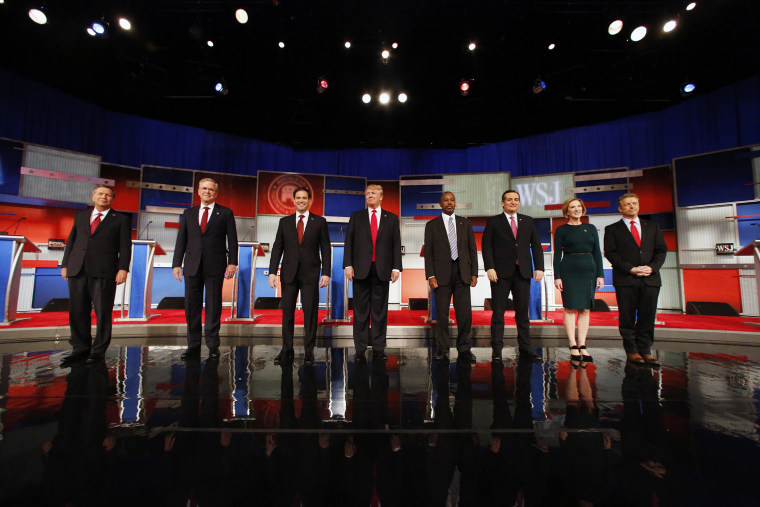It was arguably the most important question asked in any Republican presidential debate so far this year. Gerard Baker, the editor in chief of the Wall Street Journal, presented Carly Fiorina with a line of inquiry she probably wasn't expecting:
"[I]n seven years under President Obama, the U.S. has added an average of 107,000 jobs a month. Under President Clinton, the economy added about 240,000 jobs a month. Under George W. Bush, it was only 13,000 a month. If you win the nomination, you'll probably be facing a Democrat named Clinton. How are you going to respond to the claim that Democratic presidents are better at creating jobs than Republicans?"
Fiorina, as is her wont, pretended that reality has no meaning and responded, “Yes, problems have gotten much worse under Democrats” -- which contradicted the accurate question and made absolutely no sense whatsoever.
But Baker's observation presents Republicans with a challenge for which the party has no solution.
Before proceeding, let's note that Baker's question actually understated the case. The figure for President Obama was roughly accurate, but it included the horrific job losses from early 2009, when he took office in the midst of a global catastrophe he inherited from his predecessor. If we exclude his first year, Obama's average increases to about 180,000 jobs per month -- which makes George W. Bush's job totals slightly worse.
What's more, if we look back over the last quarter-century, the totals for H.W. Bush, who averaged annual job growth roughly in line with his son's totals, look even worse still for Republicans. The right will be quick to note that the employment picture was vastly brighter under Reagan, which is true, but on a per-year basis, Reagan's job growth fell short of Clinton's -- and even Carter's.
And this isn't limited to job creation. As we talked about a couple of weeks ago, in the post-World War II era, economic growth and Wall Street returns have also been better under Democratic presidents than Republican presidents. The New York Times recently published a piece from CNBC’s John Harwood, who noted that Republicans “have a data problem”: for quite a while, GOP claims about the economy have consistently been wrong, and at times, completely backwards.
Pressed for an explanation, Republicans have ... literally nothing. Some pretend not to understand the question. Others pound the table. Many recite pleasant-sounding platitudes that their party's base finds compelling, hoping no one will notice they simply can't answer the question.
Part of the problem is ideological. Republican governing is built on a philosophical foundation that tells GOP policymakers that tax breaks for the wealthy and the elimination of regulations on the private sector will necessarily create broad prosperity. When such policies have failed -- and while the opposite policies have succeeded -- it's terribly inconvenient for the party, but it doesn't seem to produce any real introspection or reevaluation of discredited ideas.
Which is precisely why we now have 15 Republican presidential candidates who not only believe the policies that cut unemployment from 10% to 5% must be forcefully rejected, but who also insist tax breaks for the wealthy and the elimination of regulations on the private sector really will work, if we just keep trying what's failed and expect a different result.
Kevin Hassett, a Republican economist, said in February, “When Hillary Clinton runs, she’s going to say, ‘The Republicans gave us a crappy economy twice, and we fixed it twice. Why would you ever trust them again?’"
And as things stand, I still haven't heard anyone in the 15-candidate field craft a coherent answer to the question.
Consider the series of events: when Clinton's economic plan was considered in Congress, it received literally zero Republican votes, and GOP lawmakers insisted that Clinton's reckless approach would cause multiple recessions and widespread despair. Instead, it succeeded beautifully.
When George W. Bush's economic plan reached Congress, Republicans backed it en masse, certain it would be a wild success. It wasn't.
In the Obama era, Republicans said the Recovery Act would fail (it succeeded); they said the rescue of the auto industry would fail (it also succeeded); and they said the White House's domestic policies would crush job growth (they did the opposite).
It's against this backdrop that GOP candidates are going into the 2016 election cycle effectively saying, "Don't believe your lying eyes; our agenda is bound to work eventually."
As an electoral matter, I realize, of course, that many voters have short memories, and the Republicans' uninterrupted track record of failure won't necessarily affect their odds of success.
But the Fiorina-Baker exchange was nevertheless one of the more important political moments of the year.
